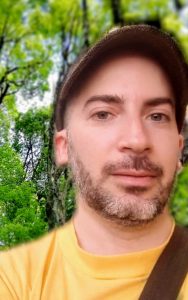

Evan Gach
PhD in Environment, 2020
“…to me, the concept of environment has always been more than our natural environment, but something that extends into our physical, mental, and cultural space and connects to all facets of our society.”
(Posted on May 25, 2020)
1) 研究テーマはなんでしたか?なぜそのテーマに関心を持ちましたか?
What was your research topic?
Why were you interested in that topic?
The topic of my research was climate justice, and more specifically the role civil society plays in shifting the world toward pursuing solutions for climate change based on human rights and environmental justice. The title of my dissertation was “The Evolving Conception of Climate Change: The Growth of Climate Justice and the Role of Transnational ENGO Networks”(気候変動概念の進展:気候正義の台頭と国際環境 NGO ネットワークの役割). It examined how the global conception of climate change has over time grown to adopt many principles of climate justice, looked at what specific issues and positions “climate justice” encapsulates, and analyzed the role civil society NGOs have played in these changes.
I’ve always been interested in environmental activism, and to me, the concept of “environment” has always been more than our natural environment, but something that extends into our physical, mental, and cultural space and connects to all facets of our society. This made the concept of environmental justice immediately appealing to me, and with climate change being the most pressing problem of our generation, focusing on climate justice was a natural move. With my research, I set out to advance the understanding of environmental justice academically, but I also wanted to make a practical contribution to the climate justice movement by clarifying and spreading the concept of climate justice and developing research that can be useful for empowering civil society in advancing just solutions for climate change.
2)ドクター論文を書いている途中で一番大変だったことは何ですか?
一番うれしかったことは何ですか?
What was the hardest experience during writing your PhD thesis?
When was your happiest moment during writing PhD thesis?
Academically, the most daunting challenge when writing my thesis began in the research planning stages. When conducting research individually, it was always difficult for me to tell if my research ideas, plans, hypotheses, etc. met the “standard” for doctoral research – especially considering that standards and expectations can be very different depending on one’s supervising professor and their academic background, field of study, and preferred research methods. This followed me throughout the writing process; I was constantly unsure of whether or not what I was writing was on the level expected for PhD research. Having a regular line of dialogue with your supervising professor where you can openly discuss these concerns and get feedback is essential to sufficiently grasp what is expected of your research and how you can best approach it.
Non-academically, as a self-funded student, balancing work, school, and other responsibilities was always a challenge for me throughout the PhD process. Every time I was working, I felt I should be spending that time on research. Whenever I was researching, I was worried about whether I was making enough money to pay for the things I needed to. And if I was doing anything fun or social, I felt guilty I wasn’t working OR researching! But it’s important to realize that a balance of all three is important – planning in advance helps a lot, and not pushing yourself too hard is absolutely vital!
For me, the happiest moments during my PhD research were the moments of validation that proved to me that my research and ideas were making a valuable contribution to the field of environmental studies and to the global climate movement. This wasn’t just about personal pride – it’s what gave me the confidence and motivation to continue with my research.
Moments that stand out were my articles being accepted for publication, my first published article getting cited by other researchers, and environmentalists I respect requesting to use my research for their own activities.
3)研究は、今の仕事にどのように役に立っていますか?
How does your research help your current job?
After finishing my doctoral thesis, I began working for an international climate NGO, which has been my goal since I first began studying environmental issues. One of the ways my research helps me in my current job is that by studying NGOs in my research, I developed an understanding of how they work, what they need to think about when developing strategies, and what kind of roles they take on in a complex international system with numerous actors. However, I was also surprised to find that many of the skills I naturally developed while doing research have prepared me for what I do in this job – such as corresponding with other NGOs, developing and giving presentations, and writing briefs and other reports.
4)あなたが推薦したい、日本で一番美しい場所はどこでしょうか?
Where is the most beautiful place in Japan that you recommend
to visit?
For me, nothing compares to the trip I took through the island of Shikoku. Beautiful beaches in Kochi, amazing hiking in Tokushima’s oboke/koboke, and Dogo Onsen in Matsuyama (Ehime) were especially memorable. I would also recommend visiting the shore of Lake Biwa in Hikone – it was the first place I ever visited in Japan, and it was enough to make me want to come back after graduating university!
5)進学希望のみなさんにメッセージをお願いします。
Your message to prospective students
I want prospective (and current) students to realize that it’s completely normal to feel lost at multiple points in your research – everybody goes through this, and it’s actually a major part of the PhD process when developing one’s research. Two things are crucial to working through those feelings of confusion: one is choosing a supervisor that is supportive and suits you and your research (i.e. has a similar background, field of study, research methods, and research interests). The other is having confidence in your ideas and work. The latter can be especially difficult, but having confidence will give you the motivation to not only see your research through, but also to present your ideas to others and know what feedback to take into account in order to improve it.
